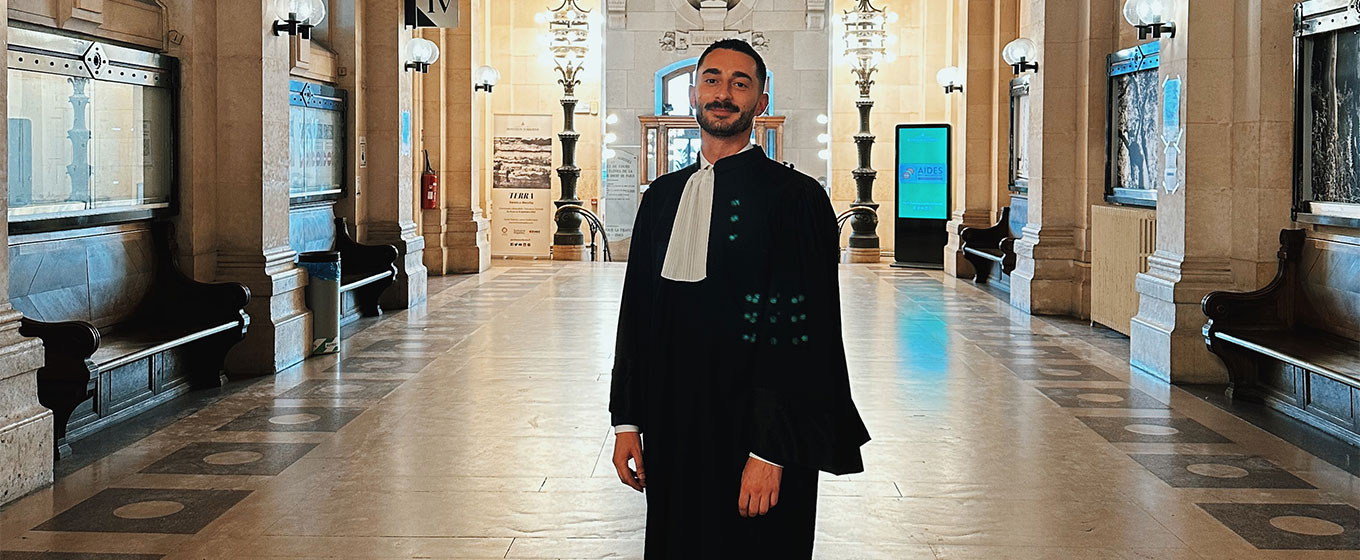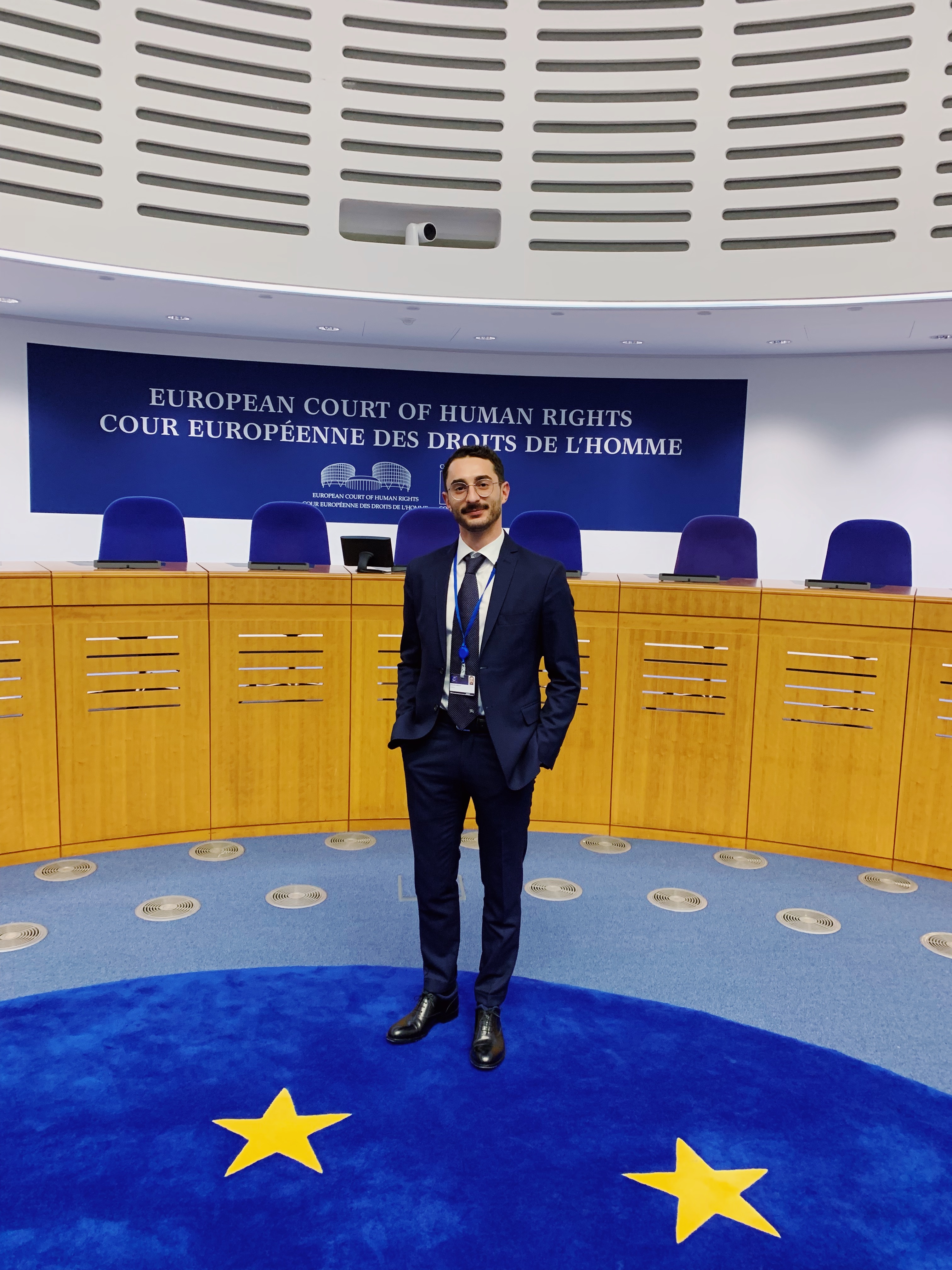From Cattolica to the Court: How Lorenzo Defends Human Rights Across Borders

By Isabella Diaz Martin
Lorenzo Acconciamessa is an Assistant Professor of International Law at the University of Palermo and an alumnus of the Faculty of Law at Università Cattolica.
He worked at the European Court of Human Rights, advocating, among others, for vulnerable individuals unable to access the judicial system. His work has highlighted the importance of protecting human rights, regardless of migration status or political discourse. Through his teaching, Lorenzo continues to inspire the next generation to advocate for human rights and emphasise the importance of international law.
Over the last few years, news outlets and social media have been flooded with breaking news and developments about the influx of migration into Western Europe. With conflicting opinions, disparaging remarks, and an overwhelming amount of information, it is easy to lose track of the current situation and what truly matters: human rights.
To explore this sensitive topic, we spoke to Dr. Lorenzo Acconciamessa, a lawyer and alumnus of Università Cattolica, who currently serves as Assistant Professor of International Law at the University of Palermo.
Lorenzo’s five-year academic journey began with the Master of Law at Università Cattolica’s Milan campus, where he developed his passion for human rights and international law. He particularly recalls the International Public Law course taught by Professor Pasquale De Sena, his thesis supervisor and mentor, and the Human Rights Law course taught by Professor Francesca De Vittor.
During his time at Cattolica, Lorenzo participated in several international programmes: he completed a summer school programme at Utrecht University in the Netherlands in 2015, spent a year in Valencia, Spain, on an Erasmus+ exchange, undertook a period of study at the Institute for International and European Studies of the Panthéon-Sorbonne University in Paris through the International Thesis programme, and attended the summer school of The Hague Academy of International Law.
After graduating, Lorenzo pursued a PhD in International Human Rights Law at the University of Palermo. During his research, he successfully applied for an Assistant Lawyer position at the European Court of Human Rights, where he spent three years drafting judgments, analysing cases with judges, and contributing to the Court’s decisions.
Lorenzo has conducted extensive research in the case law of the European Court of Human Rights. This is why we asked him a few in-depth questions to gain a deeper understanding of migration, its complexities, and the Court's role and involvement in this area.

He mentions that historically the court has been very cautious in interfering with migration regulation because it wants states to have as much freedom as possible, especially in migration due to personal or economic reasons.
“It is very hard to find strict obligations in the case law of the European Court of Human Rights concerning regularised migration, regarding their inclusion in society and support for their needs. The Court starts from the assumption that States are, in principle, free to manage migration as they wish. In contrast, there are stricter obligations concerning support for the life and the well-being of refugees who are under the control of the authorities, but when it comes to other migrants, it is much more complicated to find specific obligations.”
Lorenzo noted that there have been important developments in the Court’s case-law since 2020. During that year, the Court issued a controversial judgment that appeared to suggest there were no meaningful restrictions on States’ migration management policies. In the more recent years, the Court has progressively shifted from allowing states considerable flexibility in handling migration to enforcing stricter compliance with human rights standards.
One of Lorenzo’s main focuses of research has been: access to justice for children and vulnerable individuals. Lorenzo has done extensive research on this topic, and he found that countries are required to be increasingly flexible in allowing them to access the judicial system, with the help of Non-Governmental Organisations which are now permitted to file legal applications on behalf of children and other vulnerable individuals.
His research and publications about these topics not only provide him with the knowledge and legal capacity to answer these questions but also, as a lawyer who can discuss judgments and provide different perspectives to those making the decisions, make him an advocate for those who may lack one. The impact of his research does not stay in academia; it extends to people who need that voice.
Human rights in the case of migration have been a topic of controversial debate in social and political environments. However, Lorenzo, above all, believes in protecting human rights in all instances.
“Irrespective of any political opinion, there are human rights obligations that states have decided to undertake. So irrespective of which political opinion you may have about migration, migration must be managed in compliance with human rights obligations.”
How can the next generation advocate for international human rights? When we asked Lorenzo, he shared that he recently became an Assistant Professor of International Law at the University of Palermo. Although he valued his role at the Court, teaching was always his dream, and he embraced this new opportunity knowing the Court could remain part of his future.
Lorenzo stressed that international law courses are essential for all lawyers and international relations professionals. Today, no lawyer – whether civil, criminal or administrative, and irrespective of whether they deal with purely “national” cases – can ignore international law.
“I think that Università Cattolica does an excellent job emphasising that International Law and European Union Law are not distant or irrelevant topics, but rather essential elements that nowadays impact every field of law.”
Lorenzo Acconciamessa’s journey from Università Cattolica to the European Court of Human Rights, and now as an Assistant Professor, shows how passion, paired with commitment, can lead to work that influences both individuals and institutions. His career highlights that advocacy and using our voice can meaningfully affect others, whether individually or broadly, and reminds us that our passions can become our profession with perseverance.

